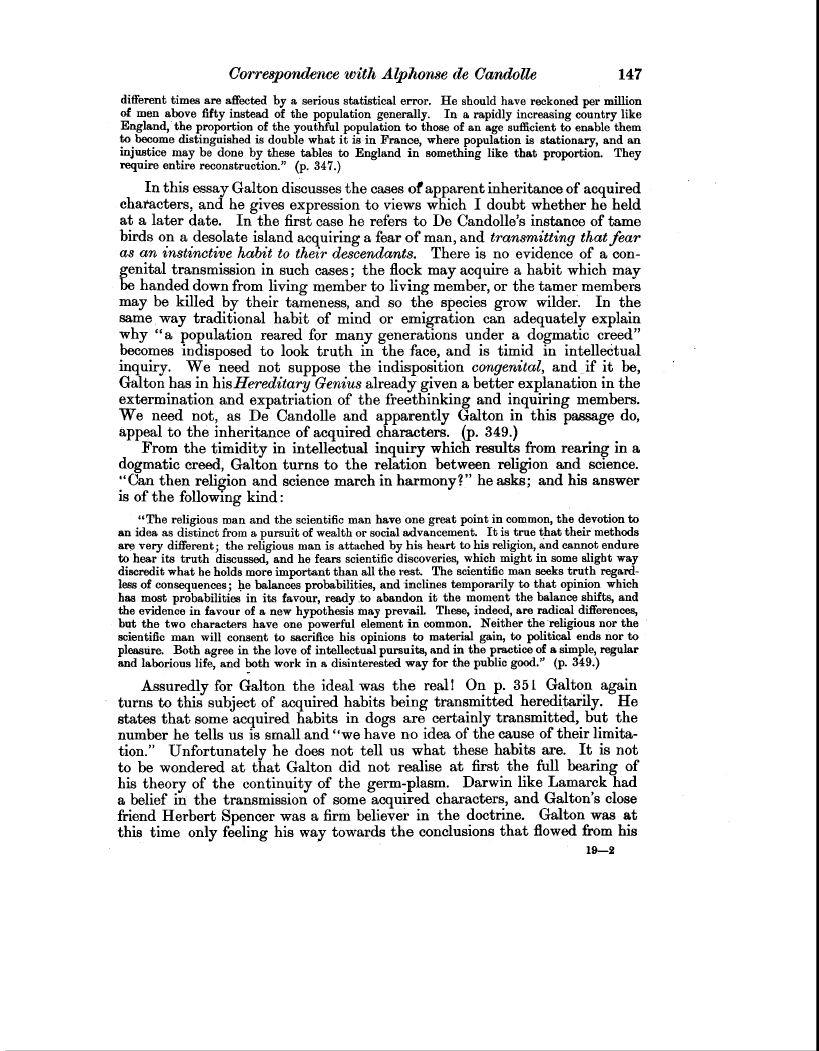Correspondence with Alphonse de Candolle 147
different times are affected by a serious statistical error. He should have reckoned per million of men above fifty instead of the population generally. In a rapidly increasing country like England, the proportion of the youthful population to those of an age sufficient to enable them to become distinguished is double what it is in France, where population is stationary, and an injustice may be done by these tables to England in something like that proportion. They
require entire reconstruction." (p. 347.)
In this essay Galton discusses the cases of apparent inheritance of acquired characters, and he gives expression to views which I doubt whether he held at a later date. In the first case he refers to De Candolle's instance of tame birds on a desolate island acquiring a fear of man, and transmitting that fear as an instinctive habit to their descendants. There is no evidence of a con
enital transmission in such cases; the flock may acquire a habit which may
handed down from living member to living member, or the tamer members may be killed by their tameness, and so the species grow wilder. In the same way traditional habit of mind or emigration can adequately explain why "a population reared for many generations under a dogmatic creed" becomes indisposed to look truth in the face, and is timid in intellectual inquiry. We need not suppose the indisposition congenital, and _if it be, Galton has in hisHereditary Genius already given a better explanation in the extermination and expatriation of the freethinking and inquiring members. We need not, as De Candolle and apparently Galton in this passage do, appeal to the inheritance of acquired characters. (p. 349.)
From the timidity in intellectual inquiry which results from rearing in a dogmatic creed, Galton turns to the relation between religion and science. "Can then religion and science march in harmony?" he asks; and his answer is of the following kind
"The religious man and the scientific man have one great point in common, the devotion to an idea as distinct from a pursuit of wealth or social advancement. It is true that their methods are very different; the religious man is attached by his heart to his religion, and cannot endure
to hear its truth discussed, and he fears scientific discoveries, which might in some slight way discredit what he holds more important than all the rest. The scientific man seeks truth regardless of consequences; he balances probabilities, and inclines temporarily to that opinion which has most probabilities in its favour, ready to abandon it the moment the balance shifts, and the evidence in favour of a new hypothesis may prevail. These, indeed, are radical differences, but the two characters have one powerful element in common. Neither the religious nor the scientific man will consent to sacrifice his opinions to material gain, to political ends nor to pleasure. Both agree in the love of intellectual pursuits, and in the practice of a simple, regular
and laborious life, and both work in a disinterested way for the public good." (p. 349.)
Assuredly for Galton the ideal was the real! On p. 351 Galton again turns to this subject of acquired habits being transmitted hereditarily. He states that some acquired habits in dogs are certainly transmitted, but the number he tells us is small and "we have no idea of the cause of their limitation." Unfortunately he does not tell us what these habits are. It is not to be wondered at that Galton did not realise at first the full bearing of his theory of the continuity of the germ-plasm. Darwin like Lamarck had a belief in the transmission of some acquired characters, and Galton's close friend Herbert Spencer was a firm believer in the doctrine. Galton was at this time only feeling his way towards the conclusions that flowed from his
19-2

